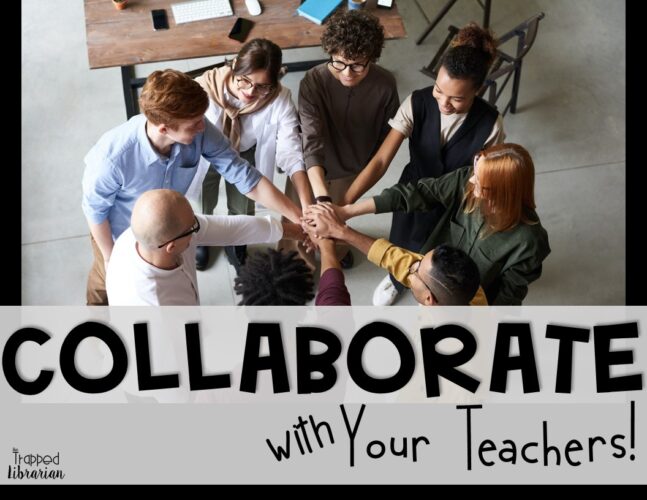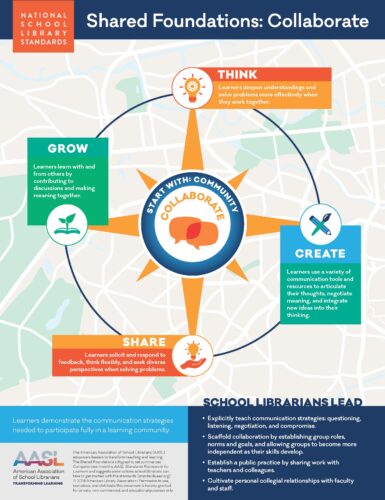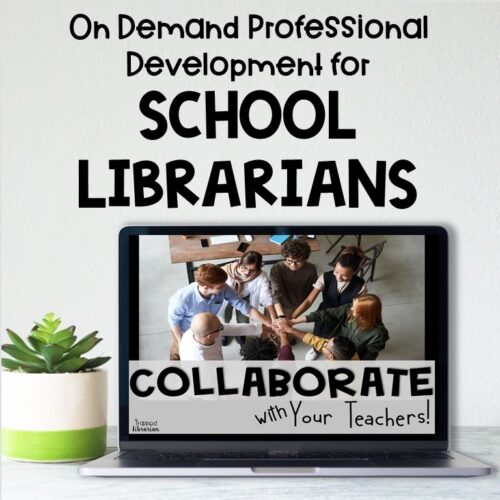Last Updated on February 12, 2022 by Laura

Collaboration in the school library has been a key component of school librarianship as long as I’ve been in the profession. Even now, “Collaborate” is one of the shared foundations in the National School Library Standards. We collaborate by working with classroom teachers and content area teachers to ensure the learning in the library augments and supports the learning taking place in the classroom. School library collaboration brings many benefits for our students.
AASL Standards Connection
Since “Collaborate” is one of the six shared foundations in AASL’s national standards, we know it is a key element of a strong school library program. Upon close look, the standards address collaboration among students as well as collaboration with teachers. Working with others collaboratively almost always results in a stronger, broader learning experience! (Click the image above to download your own copy of AASL’s Collaborate Infographic!)
COLLABORATE: Work effectively with others to broaden perspectives and work toward common goals.
AASL’s National School Library Standards p.86
This definition reminds me of the teamwork I referred to in the articles about why we advocate and how to advocate for our school libraries. Working with others in our school community makes our library program stronger and more relevant to all of its stakeholders.
Collaboration with a Flexible Schedule
If you are a school librarian operating with a flexible schedule, many of us on fixed schedules envy you! The American Association of School Librarians recommends flexible scheduling in its position statement on school library scheduling. The benefits of a flexible schedule seem endless. Since you are not providing teacher prep time, you can more readily work as a team with classroom or content area teachers. Flexible scheduling allows you to use blocks of time for projects that aren’t easily completed in a 30 – 45 minute time frame. However, I know everything isn’t easy working within a flexible schedule model. It can be difficult to convince reluctant teachers to work with you. You may not hit all of your learning targets while focusing on classroom projects.
Collaboration with a Fixed Schedule

For school librarians on a fixed schedule, collaboration can seem impossible. Since you are providing teacher prep time, it’s hard to find time to meet and plan together. Busy classroom teachers might feel like embarking on a collaborative project with you is just one more thing to add to their busy teaching responsibilities. But with regular communication and an open mind, you can find ways to collaborate with your classroom or content area teachers!
Relationships First!
Whether you are trying to collaborate with your teachers within a fixed or flexible schedule, I believe your number one priority should be developing relationships with your colleagues. This is a personal belief of mine, but also one that even AASL seems to share with me! (Take another look at the infographic to see for yourself!) Start by eating your lunch with them, and/or taking your recess breaks with them. When you get to know your coworkers as more than just the teachers down the hall, you learn to better communicate with and understand them. This is a two way street, by the way! When they get to know you, they will feel more comfortable asking you for assistance and they will be more open to activities you propose to them. If you can, attend their PLC meetings or grade level meetings. Listen and learn about the struggles and victories they are experiencing with their students. You will soon understand how you can provide library resources and instruction that will enhance classroom teaching and learning.
Ideas for Collaboration in the School Library
There are many ways to collaborate with classroom or content area teachers in your school. Here are some ideas to consider:
- Assist with a research project (teach part of it in the library).
- Gather resources for a classroom unit.
- Enhance & build upon classroom learning by carrying a theme into your library lessons.
- Host guest speakers and author visits (both in person and virtual) in the library.
- Demonstrate resources at staff meetings, lunch breaks, before or after school.
- Spearhead school wide reading initiatives.
- Support classroom reading initiatives.
- Keep the library open outside of class times for drop-in visits.
- Visit classrooms for special events.
- Invite teachers to display special class projects in the library.
- Allow special class celebrations and events to be held in the library.
- Let teachers and students know what the public library has to offer.
More Resources for Collaboration in the School Library!
For links to resources that you can use when planning more collaboration in your school library, head over to this blog post: More Ideas for Collaboration in Your School Library.
Learn More!
Are you ready to dive deeper into collaboration in the school library? This online, on demand Collaboration in the School Library PD will help you become a more confident and effective school librarian. Think outside the box about collaboration in your school library and get some ideas to streamline your collaboration efforts!
Sign up for my weekly email newsletter and I will send you the first professional development session on school library advocacy absolutely free!

Be the light!





Thank you for a great website. I am a new Library Media Specialist. I love this information you provide us with. I am in the elementary school also and love it and love my teachers and Admin.
Collaboration is wonderful and I love being there for my teachers.
Hi Bianca – thanks for visiting my blog! I agree, the library is a great place to be and collaborating with other educators is important for our students.
Hi Laura!
Thank you for all of the great ideas to start the collaboration process! As someone who is new and studying to become a teacher librarian (currently teaching Band and music explorations), I get a little worried about a teacher librarian’s schedule that is a fixed prep provider as I currently know how hard it is to collaborate while on a fixed schedule in a staff of 70.
How do you deal with so many teachers who teach different things? I could imagine planning for so many classes could get really time consuming; how do you deal with burnout or saying no to specific requests from teachers wanting to collaborate?
Thanks for all of your tips and insight!
Hi Alyssa! Yes, collaboration is difficult with a fixed schedule, and in a large school. I recommend that you start small – start with teachers who are interested, and build from there. I try to never say no. Some of the best experiences came from me being willing to say yes, even when I wasn’t sure how I could fit library standards into what my colleague proposed. I found I just had to think outside the box a little bit and it was so good for our students! Good luck to you!